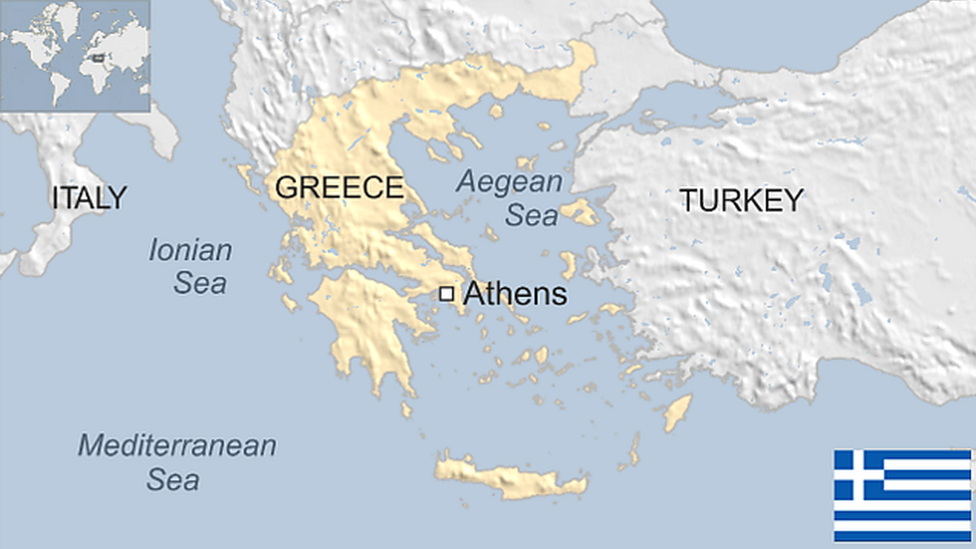Greece waste: Mounds of filth on an island paradise
- Published
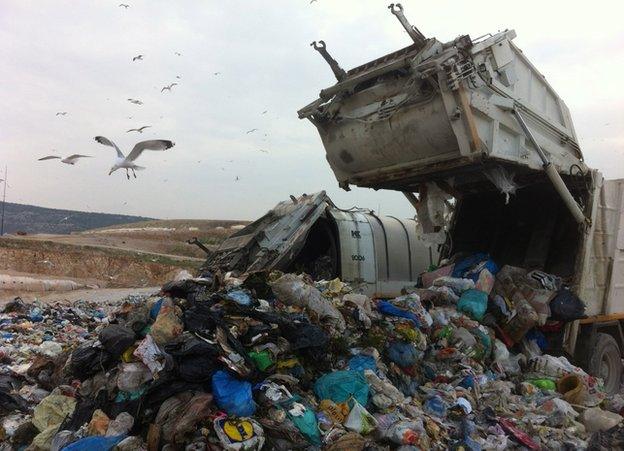
Greece's largest landfill site is almost 90% full
A putrid mix of stale waste and methane engulfing the air - that is the stench that hits you as you approach the Fyli landfill just outside Athens.
Six thousand tonnes of rubbish arrive here every day from the capital and neighbouring regions. As trucks unload what they have collected that day, thousands of seagulls swirl above, ready to dart down on to the stinking pile. But there are other scavengers too - local Roma, who wade through the mountain of waste to pick out what they need.
Most is covered by gravel and then buried into a growing mound. But it is a ticking time bomb - Greece's largest landfill site is almost 90% full and has a year left until it is totally saturated. The country's economy may be rotten but other problems are piling up too - and waste management is among the most serious.
Greece buries 80% of its rubbish - over twice the EU average. At Fyli, there is a recycling plant but it only deals with a sixth of the waste that arrives here. Metal is removed for reuse, food is made into compost and some other items are converted into alternative fuel, mainly for the cement industry. But recycling is still in its infancy here.
"Greece has been slow in dealing with waste," says Olga Skiadi, the director of waste treatment at Fyli.
"We must move forward quickly to build new plants to recycle and generate energy recovery. People must change their philosophy about the issue - waste can't just be dumped anywhere. It must be dealt with in an environmentally friendly way."
'Environmental crime'
The problem of random dumping is indeed severe. In 2005, the European Commission took Greece to court to force the closure of 1,100 illegal landfills.
Eight years on, 70 still remain. Brussels has now launched a second case against Athens, threatening a daily fine of 71,000 euros (£60,000; $98,000) until they are eradicated.
And so, as Greece takes over the rotating presidency of the EU on 1 January, it is in dispute with the very body it is supposed to run.
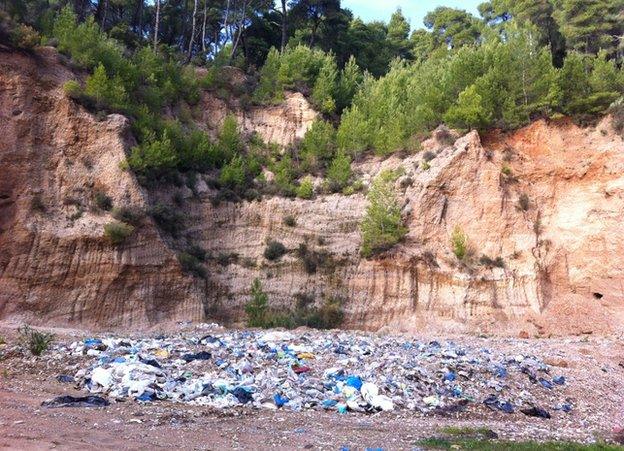
Waste is blighting Greece's countryside
The ministry of the environment told me huge progress had been made on the issue but the failure to get rid of all illegal dumps was down to three reasons - problems in the local administration, the "island character" of the country, with around half the sites on cut-off islands, and local opposition to building proper waste plants.
A site earmarked for an official landfill in Keratea, east of Athens, saw huge protests, halting its construction. But now the demonstrations have moved elsewhere, to Ilia in the Peloponnese, three hours' drive from the capital.
There, within a rich pine near from Olympia, the holy site of the ancient Olympic Games, an illegal dump has emerged.
Piles of decaying waste now infect the nearby river and surrounding area. The municipality used it until a month ago, when locals began to protest, blockading the site to demand that a proper plant be built elsewhere.
As Penelope Galanopoulou from the Ilia environmental action group shows me around, we use scarves to protect us from the stench.
"This is an environmental crime that we can't accept," she says.
"It's killing the crops nearby, the river and the soil. And it's a threat to human health. We don't know what toxic waste is dumped here and it affects our breathing, our eating and drinking. This pine forest is a living lung. Soon it will die."
'Monster of bureaucracy'
The tragedy is that amidst their dire economic crisis, Greeks always tell you that at least they have the natural beauty of their country but even that is being destroyed by waste.
In a field nearby, huge piles of rubbish lie wrapped in white sheeting - a process known as "baling" - to prepare them for burial. It is supposed to be short-term but they have been stuck here for almost four years because of the failure to build a proper plant. The white film is splitting and bits of waste seep into the stream below.
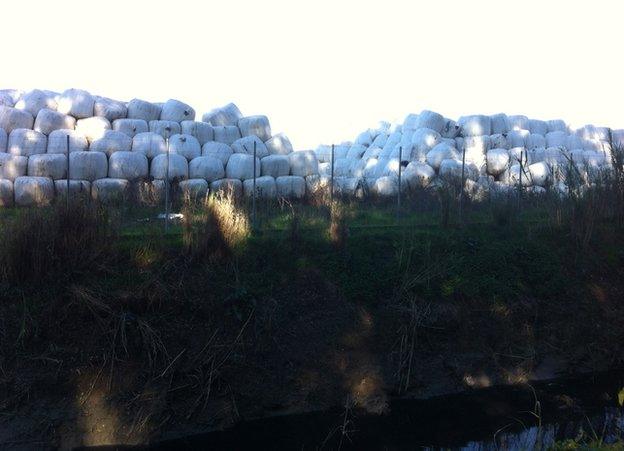
Bales of waste have been left so long they are bursting open
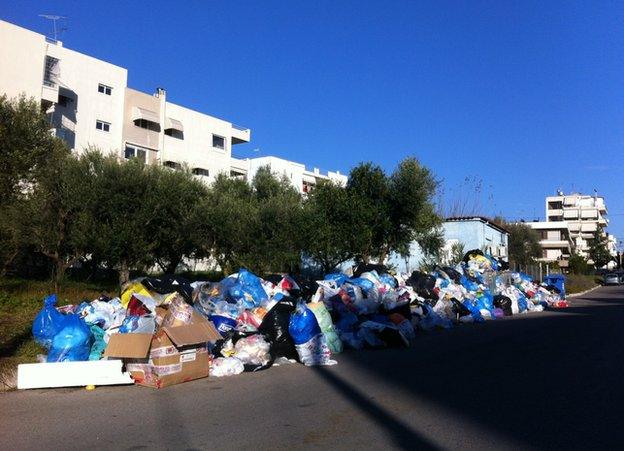
Rubbish has been piling up on the streets of Pyrgos
The neighbouring town of Pyrgos is overflowing with rubbish, with a month's worth of waste on street corners.
And there is deadlock. While locals blame the administration for mismanaging the issue, the mayor says it is their fault for blocking the forest dump, which he says was temporary, and for refusing more rubbish to be baled in preparation for a new official landfill. It is a blame game that blights any progress.
"Every time we've tried to do something, the residents stop us," says the mayor, Gerasimos Paraskevopoulos.
"Nobody wants waste in their backyard but we have to work together on this. We've also had to deal with a monster of bureaucracy. Municipalities passed the buck and there's been corruption over the years."
"But we will find a solution," he assures me, "because what's happened here is shameful."
The government says it is building three new landfills in the Athens area and is determined to rid the country of illegal dumps in the next 12 months.
But Greeks have seen countless promises broken on the issue over the years and Brussels remains unimpressed - a target for EU member states to reach zero landfill by 2020 is far from realistic here.
Today's Greece has so many problems to solve but there is now an urgent need to create a clean, sustainable environment here for the next generation to rebuild this country from its financial mess.
- Published8 August 2012
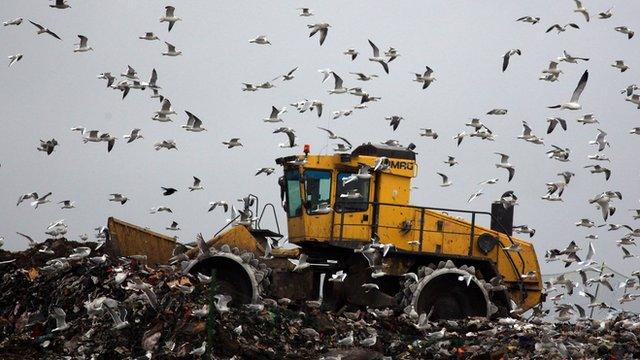
- Published6 October 2010
- Published28 June 2023
